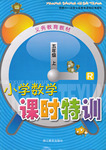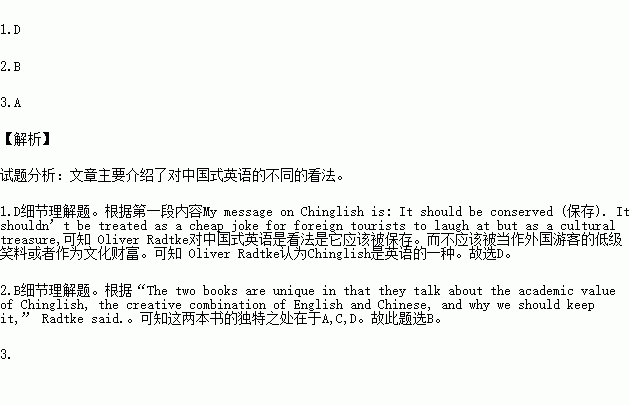题目内容
Oliver Radtke believes Chinglish mistranslations may be fun, but are not to be made fun of. “My message on Chinglish is: It should be conserved (保存). It shouldn’t be treated as a cheap joke for foreign tourists to laugh at but as a cultural treasure,” said the 32-year-old multimedia designer, who frequently visited China for almost a decade before moving to Beijing in 2007.
“I’m trying to challenge the idea that there is only one type of standard English — the English that’s spoken in America or in the British Isles — which is shortsighted, because Chinglish is already being used by millions of people to communicate with one another.”
So, since 2005, he has collected more than 5,000 examples of “the wonderful results of an English dictionary meeting Chinese grammar” on his website www.chinglish.de and has published two books on the subject.
“The two books are unique in that they talk about the academic value of Chinglish, the creative combination of English and Chinese, and why we should keep it,” Radtke said.
Patricia Schetelig, who works for the German Embassy in Beijing and regularly contributes to www.chinglish.de, said she appreciates Radtke’s approach to Chinglish.
“What’s important to me is that he’s not making fun of the way things are translated,” said she. “There are other websites doing similar things, but they’re making fun of Chinglish or saying it shouldn’t be done this way.”
Part of his mission, Radtke said, is to conserve rapidly disappearing Chinglish examples.
He was disappointed while watching the government replace Chinglish signs with standard English ones in the run-up to the Beijing Olympics. “That was a sad day for me and a sad day for Chinglish,” Radtke said.
But American David Tool, who has been closely involved in cleaning up Chinglish in Beijing since 2001, disagreed.
“Chinglish takes away from the aesthetic (美学的), educational and cultural value we want these signs to provide,” said Tool, “We get distracted when we’re trying to explain something. It’s not dealing with the issues with respect.”
1.Which of the following statements does Radtke agree with?
A. Chinglish will gradually disappear as years go by.
B. Chinglish is invented to amuse foreign tourists.
C. Chinglish will be treated as a cultural treasure.
D. Chinglish is actually a variety of English.
2.The two books are unique because it involves the following EXCEPT ________.
A. the academic value of Chinglish
B. the creativity of the Chinese people
C. the meaning of keeping Chinglish
D. the creative combination of English and Chinese
3.It can be inferred that David Tool and Radtke ________.
A. disagree on Chinglish signs
B. have both lived in China for nine years
C. once argued face to face about Chinglish
D. both have much knowledge of Chinese culture
 小学课时特训系列答案
小学课时特训系列答案
